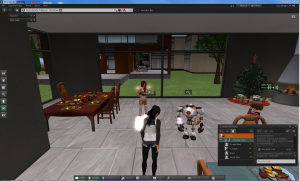Virtual communities are being used extensively in online education to create learning communities and foster collaborative learning. I would like to speak on my experience using Second Life as an inquiry-based, collaborative tool in an online implications of technology class where students were asked to explore the social, legal, and ethical aspects of computing technology by treating Second Life (SL) as a microcosmic representation of real life. This virtual play project lead to interesting critical reflections by students on the effect of virtual environments, and by extension, various technological tools on our individual digital lives. I hope this presentation would help other educators/technologists generate ideas on more innovative uses of technology as a critical pedagogical tool.
Category Archives: Collaboration
Digital Humanities: Infrastructure & Sustainability
Digital Humanities -or any new form of digital scholarship- can also bring new technical challenges. In a 2015 EDUCAUSE article The Digital Humanities Are Alive and Well and Blooming: Now What?, the author raised the question “what about those innovative digital resources that are not quite large enough to be self-sustaining?” Examples of such (DHs) projects might include: digital archives, online exhibits, digital storytelling sites, wiki or blog sites for presenting research results, companion sites for print publications, etc. In this session, let’s talk about the infrastructure and sustainability aspects of DHs projects. Potential leading/discussion points can include: best practices for running popular and stable software tools for DHs, hosting options (local vs cloud) for DHs, funding options for DHs after they “end”, DHs ownership and responsibilities for “finished” projects, etc.
Proposal: Integrating Library Resources
“If you build it, they will come”- ?
Libraries have ever more sophisticated user interfaces for discovering collections and services. But are we really meeting users where they live?
Would users find more value in library services and collections if they were available where they already are? Mobile, Blackboard (Or other Learning sytems), Portals?
What about customization? Should users be able to save (my journals, my articles) resources?
What about other tools (Browzine).
Let’s Brainstorm!




